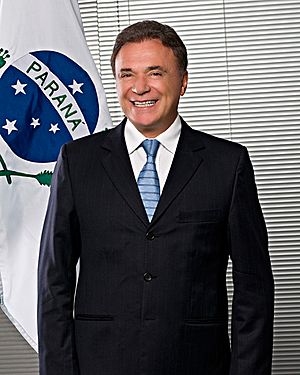Alvaro Dias facts for kids
Quick facts for kids
Alvaro Dias
|
|
|---|---|
 |
|
| Senator for Paraná | |
| In office February 1, 1999 – February 1, 2023 |
|
| Preceded by | José Eduardo de Andrade Vieira |
| Succeeded by | Sergio Moro |
| In office February 1, 1983 – March 14, 1987 |
|
| Preceded by | Leite Chaves |
| Succeeded by | Leite Chaves |
| Governor of Paraná | |
| In office March 15, 1987 – March 15, 1991 |
|
| Vice Governor | Ary Queiroz |
| Preceded by | João Elísio Ferraz de Campos |
| Succeeded by | Roberto Requião |
| Member of the Chamber of Deputies | |
| In office February 1, 1975 – February 1, 1983 |
|
| Constituency | Paraná |
| Member of the Legislative Assembly of Paraná | |
| In office February 1, 1971 – February 1, 1975 |
|
| Constituency | At-large |
| Member of the Municipal Chamber of Londrina | |
| In office February 1, 1969 – February 1, 1971 |
|
| Constituency | At-large |
| Personal details | |
| Born | December 7, 1944 Quatá, São Paulo, Brazil |
| Political party | PODE (2017–present) |
| Other political affiliations |
|
| Spouse | Débora Amaral de Almeida |
| Alma mater | State University of Londrina |
Alvaro Fernandes Dias was born on December 7, 1944. He is a well-known Brazilian politician. He represented the state of Paraná in the Federal Senate for many years. He was a senator from 1999 until 2023. Before that, he also served as the governor of Paraná. He is a member of the political party called Podemos.
Contents
Early Life and First Steps in Politics
Alvaro Dias was born in a town called Quatá, in the countryside of São Paulo state. His father, Silvino Fernandes Dias, was a farmer, and his mother, Helena Fregadolli, was a housewife. He grew up in the city of Maringá, which is in the state of Paraná.
He went to the State University of Londrina and finished his history degree in 1967. After college, he started his political journey. In 1968, he was elected as an alderman for the city of Londrina. An alderman is like a city council member who helps make decisions for the local community. He was part of the Brazilian Democratic Movement (MDB) party at that time.
In 1970, Alvaro Dias was elected to be a state deputy for Paraná. A state deputy helps make laws for their state. Four years later, in 1974, he was elected to the Chamber of Deputies. This is part of the national government, similar to the House of Representatives in other countries. He was re-elected to this position in 1978.
Becoming Governor and Senator
In 1982, Alvaro Dias was elected to the Federal Senate. A senator represents their state at the national level and helps create laws for the whole country.
In 1986, he ran for Governor of Paraná and won. As governor, he was in charge of leading the state government. During his second year as governor, about 90% of people approved of his work. In 1989, he tried to become the presidential candidate for his party, PMDB, but he did not win. After this, he left the PMDB party and joined the Social Labour Party (PST).
In 1994, Dias joined the Progressive Party (PP). He ran for governor of Paraná again but lost the election. Later that same year, he left the PP and joined the Brazilian Social Democracy Party (PSDB). In 1999, he became a senator for Paraná again, serving until 2023.
Running for President
On August 4, 2018, Alvaro Dias officially announced that he would run for President of Brazil in the 2018 elections. He ran as a member of the Podemos party. His campaign received support from other political parties, including the Social Christian Party (PSC) and the Progressive Republican Party (PRP). An economist named Paulo Rabello de Castro joined his campaign as his running mate for vice president.
Understanding the "Teacher's Massacre" Event
On August 30, 1988, an event occurred in Paraná involving the state's Military Police and teachers. The teachers were on strike for their rights and were demonstrating in the state capital. The strike had been going on for about fifteen days.
During the demonstration, a confrontation happened between the police and the teachers. The police used methods like stun bombs, horses, and dogs. Reports from that time indicate that ten people were injured, and five protesters were arrested. The Paraná Teachers Association has since worked to document this event. They have shared videos and information about what happened.
Alvaro Dias, who was the governor at the time, has a different view of the event. He has stated that there was no harsh police action. He believes the event was used for political reasons. In 1988, the state government published an advertisement suggesting that some details might be twisted by personal or political interests. In 2018, during an interview, when asked about the event, he called it "fake news" and a "lie." He also suggested that the date is only remembered by the Teachers’ Association, which he linked to the Worker's Party.
See also
 In Spanish: Álvaro Dias para niños
In Spanish: Álvaro Dias para niños

